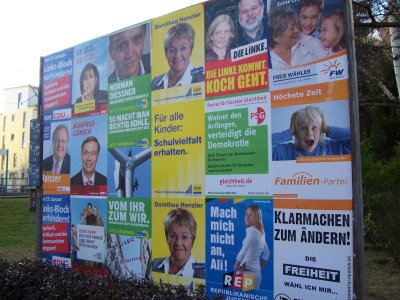Local elections are taking place today in Hessen. To be precise, these are Länder elections and as such, I am not eligible to vote in them.
As an EU-citizen, I am eligible for all other local elections (town, district) and for EU elections, but not for those on Länder or national levels.
But whilst I may not be able to directly influence the outcome by voting, I still have my opinion about the parties and their politics, although a lot of the time my thoughts are more about the presentation than the content.

Election posters in Oberursel
CDU
Since the current Ministerpräsident Roland Koch stated that he wanted to do more to combat crimes amongst youths, in particular foreign youths, I haven’t heard anything much more from the CDU about their policies. In my opinion they are relying on people thinking they’ve done a good job and wanting to keep them in power.
The trouble is that a lot of recent policies have been unpopular with voters. Will this tactic be enough?
SPD
Anything that Roland Koch has to say, is being commented on by Kurt Beck, his opposite number in the Rhineland-Palatinate and leader of the SPD. It was only about 2 weeks ago that I learnt the name of the SPD candidate: Andrea Ypsilanti. In the last few days I’ve finally heard some of her policies: free child-care places, getting rid of the student fees, and fighting terrorism without making everyone a target.
The policies sound good, but are they enough for an (in my opinion) unknown politician to win such an important vote? She’s definitely been actively campaigning in the last few days, putting post-its on peoples’ letter boxes reminding them to vote.
She also wants to move away from nuclear and fossil fuels. Again, I’ve heard that she wants to do it, but not how.
FDP
The FDP policies seem to mix a mixture of the CDU and SPD ones – maybe not surprising for a centre party. They want to keep the student fees, but possibly at a lower level, maybe not for everyone.
In fact, most of the policies sound like that – a compromise.
Grüne Partei (Green party)
I have heard next to nothing from the Grüne Partei this year – except their posters. The main topic is unsurprisingly their energy policy, but integration is also playing an important role.
Other parties
With those parties controlling about 92% of the vote at the last estimate, the rest are probably insignificant and little has been heard of them in Oberursel, other than the right-wing NDP putting their newsletter through the letter boxes.
One independent candidate did, however, make it onto local television. “Kadim Sanli” would like to make cigarettes available only on prescription. It sounds like an interesting idea, until you read the rest of his policies – the one’s that didn’t get broadcast in the interview. Such as only allowing women to work for 4 hours, or making cannibalism legal!
Summary
I’ve got so used to be spoken to on the streets (at the station, in the town centre, etc.) before elections, that it’s been rather a quiet campaign. I was even in Frankfurt yesterday on the Zeil (main shopping are) and there was very little happening. The SPD were out in force, but the FDP had a stand and were not out speaking to passers by, they were waiting for people to speak to them. The CDU were nowhere to be seen.
I think that the SPD have made a good showing in the last few days, and CDU really are relying too much on their track record. The FDP could have been a strong opponent, but haven’t really attempted to be. The rest can talk about issues, but don’t have enough followers in Hessen to make a big difference.
Tomorrow we’ll know if I’m right!
